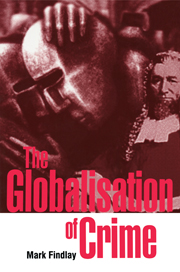Book contents
- Frontmatter
- Contents
- Preface
- Acknowledgements
- Introduction: Notions of context and globalisation
- 1 (Mis)representing crime
- 2 Crime and social development
- 3 Crime and social dysfunction
- 4 Marginalisation and crime relationships
- 5 Crime economies
- 6 Crime as choice
- 7 Integrating crime control
- Epilogue
- Bibliography
- Index
2 - Crime and social development
Published online by Cambridge University Press: 22 September 2009
- Frontmatter
- Contents
- Preface
- Acknowledgements
- Introduction: Notions of context and globalisation
- 1 (Mis)representing crime
- 2 Crime and social development
- 3 Crime and social dysfunction
- 4 Marginalisation and crime relationships
- 5 Crime economies
- 6 Crime as choice
- 7 Integrating crime control
- Epilogue
- Bibliography
- Index
Summary
Introduction
The many social paradoxes accompanying and arising out of socio-economic development provide a fertile context for crime. This is not only because so many of the intended and unscheduled consequences of development have been identified as criminogenic. Crime presents another choice to individuals, communities and cultures marginalised through modernisation and responding to development politics. Crime is an essential result of modernisation and development, as much as socio-economic disparity and marginalisation. Unfortunately, this recognition of the place of crime is too often constructed as dysfunctional rather than as a natural consequence of modernisation and development.
The preferred, and advertised, dimension of these paradoxes favours development for its local and international economic benefits. Strong proponents of development strategies (the global financial institutions) are the driving force behind the world development agenda. More recently, institutions such as the World Bank and the Asia Development Bank have identified law and order issues as concerns for the structural adjustment of developing economies. This has been in terms of the deleterious effects on economic confidence, caused by crime and disorder, rather than their inherent connection with development paradigms.
If crime is conceded as one of the behavioural or structurally negative consequences of development, then it is the pace, place or personalities of change which are conventionally regarded as responsible. In so doing the advocates of development are able to deflect the ‘blame’ for any crime/development correlation away from the necessary contextual features of development and on to corrupt bureaucrats, lazy politicians or uncommitted communities.
- Type
- Chapter
- Information
- The Globalisation of CrimeUnderstanding Transitional Relationships in Context, pp. 58 - 93Publisher: Cambridge University PressPrint publication year: 1999



